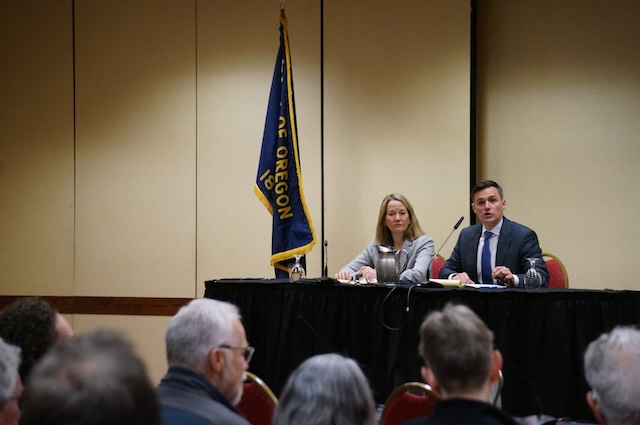Oregon Attorney General leads suit against Trump, administration to block tariffs
Published 2:21 pm Wednesday, April 23, 2025

- Oregon Attorney General Dan Rayfield (right) and Arizona Attorney General Kris Mayes (left) at a town hall they hosted in Portland April 10, 2025. Nearly 200 people came to discuss concerns about President Trump's executive orders and cuts to federal agencies. The two states attorneys general are among 23 Democratic attorneys general nationwide who have sued the federal government more than a dozen times in the first three months of Trump's second term. (Alex Baumhardt/Oregon Capital Chronicle)
Oregon is leading 11 other states in suing President Donald Trump and officials in his administration over tariffs that have touched nearly all goods imported into the U.S.
The suit, State of Oregon, et al., v. Trump, et al., was filed Wednesday by Oregon Attorney General Dan Rayfield and 11 other Democratic state attorneys general in the Court of International Trade in New York. It names Trump, the U.S. Department of Homeland Security and its leader, Kristi Noem, and U.S. Customs and Border Patrol and its leader, Peter Flores.
The attorneys general — from Arizona, Colorado, Connecticut, Delaware, Illinois, Maine, Minnesota, Nevada, New Mexico, New York and Vermont as well as Oregon— are challenging four of Trump’s executive orders that have added a 145% tariff on most imports from China; a 25% tariff on most imports from Canada and Mexico; and a 10% tariff on most all other goods imported to the U.S. The suit also preemptively challenges Trump’s plan to raise tariffs on imports from more than 40 other countries on July 9, according to a news release from the Attorney General’s Office.
“We cannot sit quietly while the president takes actions that are going to cost us jobs, increase the prices that we pay, and harm our economy,” Rayfield told reporters Wednesday at a news conference held at the Oregon Department of Justice in Portland.
Experts estimate tariffs could raise the cost of living for the average family nationwide by more than $3,800 a year, according to a report from the Budget Lab at Yale University.
Rayfield and the attorneys general argue Trump is unlawfully using the International Emergency Economic Powers Act to impose tariffs that are, under Article I of the U.S. Constitution, powers granted only to Congress, not the Executive Branch. The 1977 Emergency Economic Powers Act gives the president broad latitude on financial regulation and foreign policy if a national emergency, described as an “unusual and extraordinary threat,” is declared.
The attorneys general argue no such threat exists, and that no president before Trump has imposed tariffs based on the Emergency Economic Powers Act.
“Congress has the sole authority to set tariff policy,” Rayfield said. “Congress has enacted various laws that allow the president to implement tariffs under certain conditions, but most importantly, certain safeguards. And it’s these conditions and safeguards that the president doesn’t like.”
Employment fears
Rayfield was joined by state Rep. Daniel Nguyễn, D-Lake Oswego, and co-founder of Portland-based Bambuza Vietnam Kitchen; Pat Hubbell, owner of Brooklyn Pharmacy in Portland; Graham Trainor, president of Oregon AFL-CIO, a federation of more than 300,000 unionized Oregonians working in construction, education, health care and manufacturing; Todd Nelson, co-owner of Bountiful Farms in Woodburn; Cody Sullivan, the first person with Down syndrome to graduate with a four-year degree from an Oregon college, and Ann Donaca, Sullivan’s aide and a retired educator.
Nguyễn said Bambuza, like all businesses, is struggling to deal with the economic insecurity wrought by the tariffs. He said the business has stocked many of its Vietnamese imports, such as rice paper, rice noodles and coffee, but he knows they will not last long.
“This survival mentality might save an individual business in a pinch, but it can’t be sustained, and it can be devastating for our broader economy,” he said.
Trainor said Trump’s erratic use of tariffs lacks a clear strategy, making them detrimental rather than beneficial for workers. He said many union members are “wondering if their jobs will still exist tomorrow.”
“What we need is a comprehensive trade policy that puts workers first,” he said. “That means targeting unfair trade practices, investing in domestic industries and ensuring that tariffs are used strategically, not just as political weapons.”
Sullivan has been applying for jobs unsuccessfully for three years. Donaca said that’s only going to get harder in an economy where hiring slows altogether due to economic uncertainty.
Feeling the pain
Both Gov. Tina Kotek and Oregon’s U.S. Sen. Ron Wyden, a Democrat, held roundtables recently with small and medium business owners to discuss the impact of tariffs.
Business leaders told Kotek April 16 they were frustrated at the speed and inconsistency with which tariffs are being issued, and some said their businesses might not survive if tariffs continue for much longer.
“We believe manufacturers our size are going to go under,” Emma Mcilroy, CEO of Portland-based clothing company Wildfang, told Kotek.
Oregon’s state economist, Carl Riccadonna, joined Kotek’s roundtable discussion. He has encouraged business owners to take a survey from Business Oregon, the state’s economic development agency, so it can gather more information about tariff impacts.
Riccadonna said the full impact of tariffs on Oregon’s economy — measured by growth of new or existing businesses, increases in hiring and decreases in inflation — likely won’t be known until mid-summer.
At a roundtable with businesses held at the Port of Portland Monday, Wyden said he and Kentucky’s senior U.S. Sen. Rand Paul, a Republican, would introduce legislation to end Trump’s tariffs as early as next week.
Wyden described it as “one of the most important matters I’ve ever been involved with in my entire life.”
“I think the stakes are that high,” he said.







